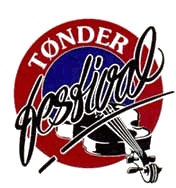
Bye and bye, Lord, bye ...
Tønder 2005
Tønder 2004
2004b
2003a
2003b
2003c
2002a
2002b
2002c
2001a
2001b
2000
1999a
1999b
1998
www.tf.dk
FolkWorld Issue 34 11/2007; Photo Report


A Decade of Folk
Tønder Festival
'The international folk music scene has never been so vibrant, productive and exciting. There is a wealth of new and established artists ...', the Tønder Festival proudly stated in 1998. A decade later, Denmark's premier folk festival keeps singing 'Will the Circle Be Unbroken'.
 Bye and bye, Lord, bye ... Tønder 2005 Tønder 2004 2004b 2003a 2003b 2003c 2002a 2002b 2002c 2001a 2001b 2000 1999a 1999b 1998 www.tf.dk |
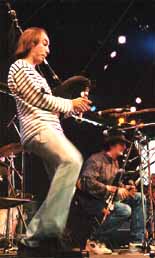
Carlos Núñez (1998) |
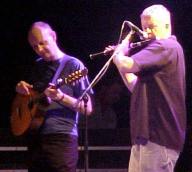
Dervish (2002) |

Sharon Shannon (2000) |
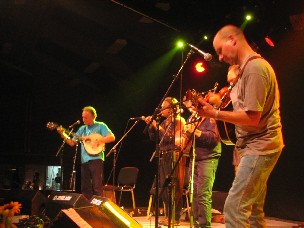
Mozaik (2005) |
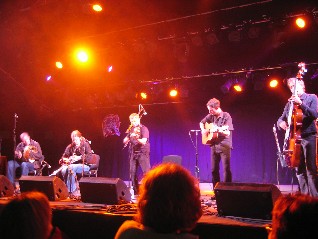
Lunasa (2006) |
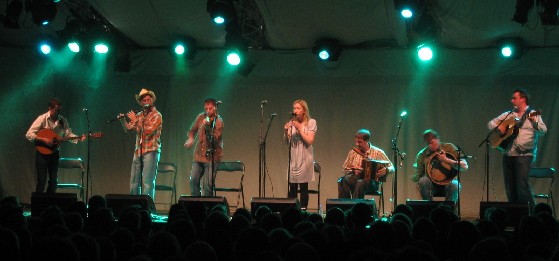
Since the young Irish group Danú
gave their first concert in Denmark at the 1997 Tønder Festival, they have
developed and matured their repertoire and style to the point where they are now
in a league with much older colleagues in Irish traditional music.
Their second CD prompted the Danish music critic Søren Chr. Kirkegaard to write:
Danú demonstrate a supreme mastery of the dramatic changes of tempo which
are such a speciality in Irish music. The listener has the impression that the
group are racing along at 150 miles an hour, then they change up to fifth gear,
giving the tempo a step up, without getting breathless. Danú never
haste unduly. The group's members are so technically proficient and so tight that
they can manoeuvre even at very high speeds.
Danú also have the balance to slow the tempo down and deliver the dreamy
songs and ballads that complete the picture of a perfect Irish traditional band.
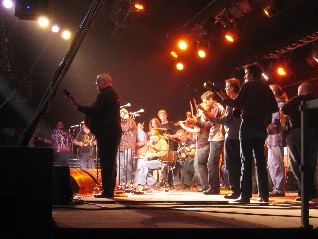
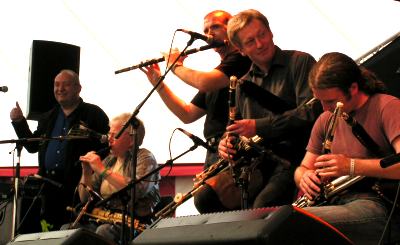
Sunday Afternooon Ceilidh, emcees Brian McNeill and Ron Kavana (2006, 2004)
Scotsman Brian McNeill and Irishman Ron Kavana have made an indelible mark on Tønder Festival. The passionate musicality and driving energy Brian McNeill and Ron Kavana bring to their own concerts have also driven the massively popular Sunday afternoon Ceilidhs in the big marquees, life-changing experiences for both audience and musicians. Brian McNeill's many roles include multi-instrumentalist, singer, author, and director of the traditional music school at The Royal Scottish Academy of Music and Drama in Glasgow, where one of his recent initiatives is Young Folk Musicians Crossing Borders. Ron Kavana has a similarly impressive CV. Singer, multi-instrumentalist, song-writer, producer, project director and author. Ron Kavana's energies and commitment are legendary. Always prepared to explore new musical routes, either solo or with a band, acoustic or electric, traditional or folk-rock, Ron Kavana creates new recipes and wipes out musical borders.
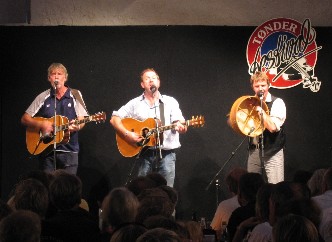
The McCalmans (2007) |

Session A9 (2007) |
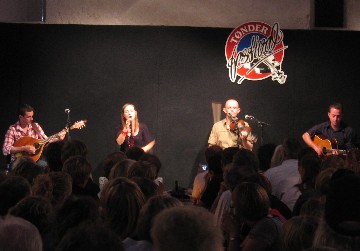
Julie Fowlis (2007) |
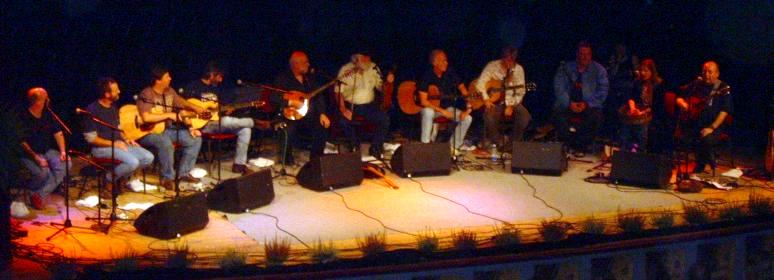
Songwriter's Circle (2003)
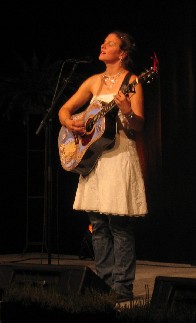
Antje Duvekot (2007) |
Chuck Brodsky calls himself a folk singer and uses the title with pride. From the same stable as Woody Guthrie and John Prine, he has a sharp eye for detail and his own special humour and irony. And like Guthrie and Prine, Chuck Brodsky has a rare talent for spinning a good old-fashioned yarn in his songs. Chuck Brodsky writes simple, ear-hanging tunes with clear, precise guitar accompaniment - the simplicity that is the real thing without fancy packaging.
David Francey, born in 1954 in Ayrshire, Scotland, was 12 when his parents emigrated to Toronto in Canada. David Francey later travelled the country on his own, hitchhiking and working his way three times across Canada, learning about the place and its people. Many of these impressions are imbedded in his songs, songs written with insight respect and love for these people he met and worked with.
Canadian multi-instrumentalist and songwriter J.P. Cormier is a man of surprisingly many talents. He plays eight instruments, sings and writes infectious songs. In his 22-year musical career he has achieved more than most musicians drea of. The list of concerts, TV appearances and studio sessions, with musicians such as Waylon Jennings, Marty Stuart, Earl Scruggs, Vince Gill and Alan Jackson is almost incredible. Then add J.P. Cormier's many recordings and 300 live performances a year, and it becomes breathtaking.
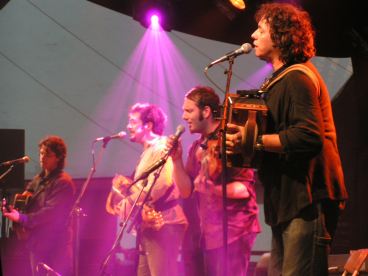
Le Vent du Nord (2004) |
There's no one writing like her today, says Solas founder Seamus Egan, who produced Antje Duvekot's first major studio cd, Big Dream Boulevard. The first thing you notice is her voice. Soft phrasing, letting us know she believes every word she sings. Antje Duvekot's first childhood was in Germany, surrounded by music and song. The move to USA meant adjusting to a new family, a new language, trying to make new friends. Somehow, her songs open the personal out to be universal. Antje Duvekot boldly reminds outcasts that only they can break out of their shells. I think she's going to be the next great American folk singer-songwriter, writes folk-pop songwriter Ellis Paul.
The Quebec group Le Vent du Nord (North Wind) comprises musicians from some of the best-known bands in the province. In the two short years the group has existed, their experience, energy and expert musicianship give the Quebec and Breton musical traditions completely new dimensions.
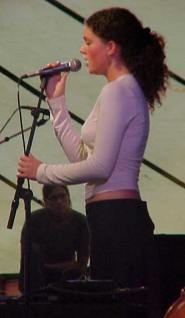
Zar (2002) |
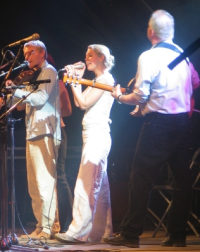
Haugaard, Høirup, Blum (2004) |
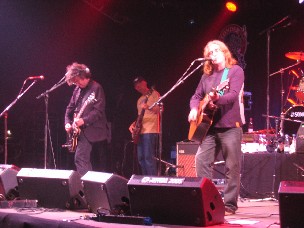
Saw Doctors (2005) |
From headline performances at Glastonbury and festivals throughout the
world to intimate acoustic shows, the
Levellers
have long been one of the best live bands around. With a keen political
eye and uncompromising attitudes they've always led from the front.
As their 20th anniversary approaches in 2008, the Levellers have proved
themselves as a great British band that is now firmly lodged in the public's
consciousness. Levellers have clearly stood the test of time, the original
line-up still playing with a passion and pride that is still setting
standards. The songs too sound as fresh as the day they were written.
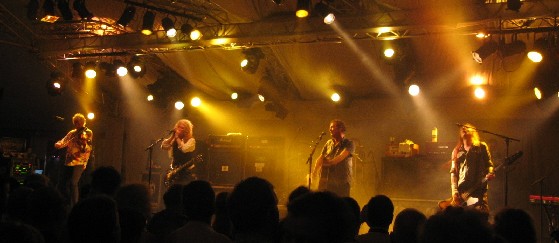
Levellers (2007)
| Text excerpts by courtesy of the Tønder Festival programmes 1998-2007. |
Photo Credits:
(1) Tønder Logo (taken from Tønder Festival website);
(2) Carlos Núñez,
(4) Sharon Shannon,
(9) Ceilidh,
(15) Le Vent du Nord (by The Mollis);
(3) Dervish,
(16) Zar (by Eugene Graham);
(5) Mozaik,
(6) Lúnasa,
(7) Danú,
(8) Ceilidh,
(10) The McCalmans,
(11) Session A9,
(12) Julie Fowlis,
(14) Antje Duvekot,
(18) Saw Doctors,
(19) Levellers
(by Walkin' Tom);
(13) Songwriter's Circle (by Gerald Trebaticky );
(17) Haugaard & Høirup /
Blum (by Michael G. Rose).
|
To the German FolkWorld |
© The Mollis - Editors of FolkWorld; Published 11/2007
All material published in FolkWorld is © The Author via FolkWorld. Storage for private use is allowed and welcome. Reviews and extracts of up to 200 words may be freely quoted and reproduced, if source and author are acknowledged. For any other reproduction please ask the Editors for permission. Although any external links from FolkWorld are chosen with greatest care, FolkWorld and its editors do not take any responsibility for the content of the linked external websites.
